Conversational AI in Healthcare: A Complete Guide For 2025
Conversational AI is revolutionizing the healthcare industry, offering new ways to enhance patient care, streamline operations, and improve diagnostic accuracy. In 2025, the integration of AI-powered chatbots, virtual assistants, and natural language processing (NLP) systems is set to become a cornerstone of healthcare delivery. From automating administrative tasks like scheduling and billing to providing round-the-clock support through virtual consultations, Conversational AI is making healthcare more accessible and efficient. Its ability to analyze patient data and deliver personalized care recommendations is transforming the patient experience.
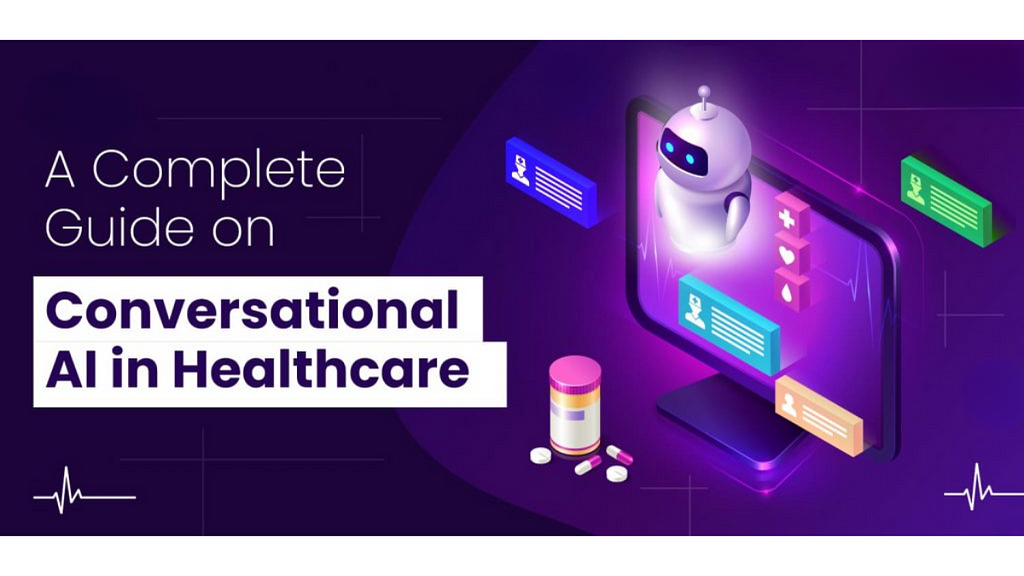
Additionally, AI-powered tools can assist healthcare professionals by automating routine tasks, enabling faster decision-making, and freeing up time for more complex medical cases. As AI continues to evolve, it promises to bridge gaps in care, reduce costs, and improve overall health outcomes. This guide will explore the key developments in Conversational AI for healthcare in 2025, highlighting its benefits, challenges, and potential future impact on the industry. Dive in to discover how AI is shaping the future of healthcare delivery.
Table of ContentUnderstanding AIWhat is Conversational AI in Healthcare?
How Conversational AI is Transforming Healthcare?
Key Benefits of Conversational AI in Healthcare
Conversational AI in Medical Research and Data Analytics
Considerations for Building a Conversational AI Strategy for Healthcare Organizations
Key Use Cases and Applications of Conversational AI in Healthcare
Data Privacy and Ethical Considerations
Challenges Facing Conversational AI in Healthcare
The Future of Conversational AI in Healthcare
ConclusionUnderstanding AI
Artificial Intelligence (AI) is a field of computer science that enables machines to mimic human intelligence and perform tasks that traditionally require human cognitive abilities. At its core, AI involves the development of algorithms and models that allow computers to learn from data, make decisions, and solve problems autonomously. AI can range from narrow AI, which is designed for specific tasks like facial recognition or language translation, to general AI, which aims to perform any intellectual task a human can do.
Key technologies within AI include machine learning, where systems learn patterns from large datasets, and natural language processing (NLP), which enables computers to understand and generate human language. AI is transforming industries such as healthcare, finance, and transportation by automating tasks, improving efficiency, and enabling more accurate decision-making. As AI continues to evolve, its potential to augment human capabilities and reshape the future of work, society, and innovation is both exciting and profound.
What is Conversational AI in Healthcare?Conversational AI in healthcare refers to the use of advanced technologies, such as artificial intelligence (AI) and natural language processing (NLP), to enable machines to engage in human-like conversations with patients and healthcare providers. These AI-powered systems, including chatbots and virtual assistants, can interpret and respond to spoken or written language, making healthcare services more accessible and efficient. Conversational AI is being used to handle various tasks, such as scheduling appointments, providing medical information, answering patient queries, and even offering mental health support.
In clinical settings, it can assist doctors by gathering patient information, suggesting diagnoses, and streamlining documentation. Additionally, it allows patients to receive real-time assistance from anywhere, improving accessibility and reducing the burden on healthcare staff. The technology’s ability to process and analyze large amounts of medical data also enhances personalized care, enabling more accurate diagnoses and tailored treatment plans. As it continues to evolve, Conversational AI promises to play an increasingly important role in the future of healthcare delivery.
How Conversational AI is Transforming Healthcare?The healthcare industry is undergoing a significant transformation, driven by the rapid advancements in Conversational AI. From improving patient care to streamlining operations, here are some ways Conversational AI is revolutionizing healthcare:
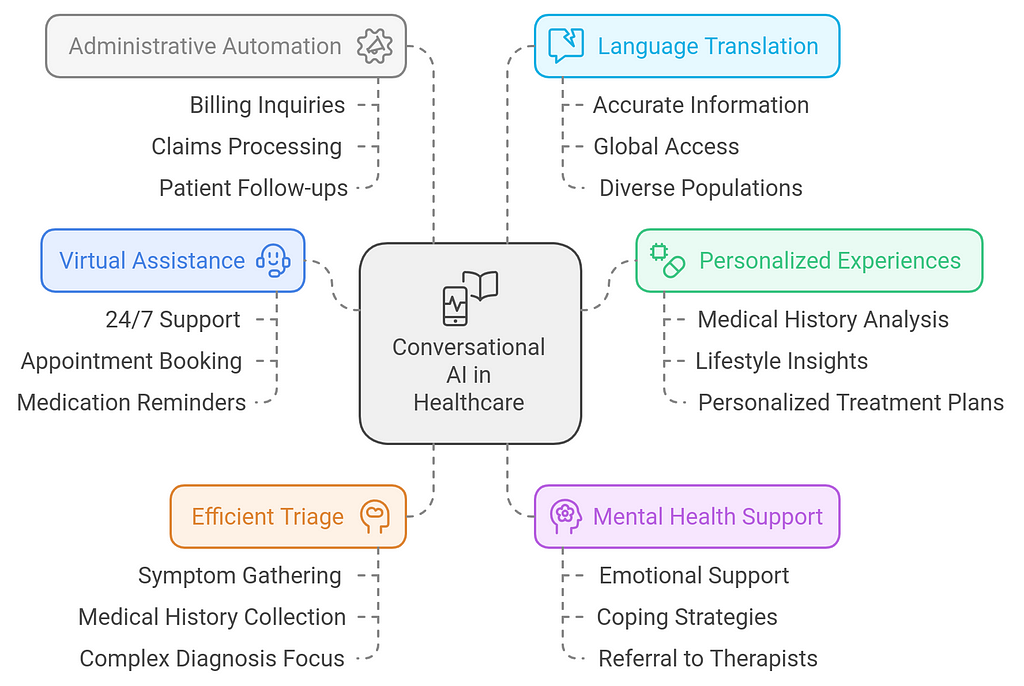
- 24/7 Virtual Assistance: Conversational AI-powered chatbots and virtual assistants are now providing round-the-clock support for patients. Whether it’s answering basic questions, booking appointments, or offering medication reminders, these tools ensure patients have access to reliable information and services without long wait times.
- Personalized Patient Experiences: AI-driven systems are capable of analyzing a patient’s medical history, lifestyle, and preferences to provide personalized health advice. This can lead to more tailored treatment plans, preventive measures, and better outcomes.
- Efficient Triage and Diagnosis: AI chatbots can perform initial patient triaging by gathering information about symptoms and medical history before a formal consultation. This can help doctors prioritize critical cases and spend more time on complex diagnoses, leading to faster, more effective care.
- Mental Health Support: Conversational AI is playing a growing role in mental health care. AI chatbots are now being used to provide emotional support and counseling to those experiencing stress, anxiety, or depression. These bots can track patient emotions, offer coping strategies, and refer individuals to human therapists when needed.
- Healthcare Administration Automation: Conversational AI reduces the administrative burden in hospitals by automating routine tasks such as billing inquiries, claims processing, and patient follow-ups. This boosts efficiency and allows healthcare professionals to focus more on patient care.
- Breaking Language Barriers: AI translation tools embedded in healthcare chatbots can bridge language gaps, ensuring non-native speakers receive accurate information and guidance. This expands access to healthcare services globally, improving outcomes for diverse populations.
As Conversational AI continues to evolve, its potential to enhance the efficiency, accessibility, and personalization of healthcare services is bound to grow. It’s more than just a technological shift; it’s a pathway toward more patient-centered, proactive care.
Key Benefits of Conversational AI in HealthcareConversational AI is rapidly becoming a game-changer in healthcare, offering significant advantages for both patients and providers. Here are some of the key benefits:
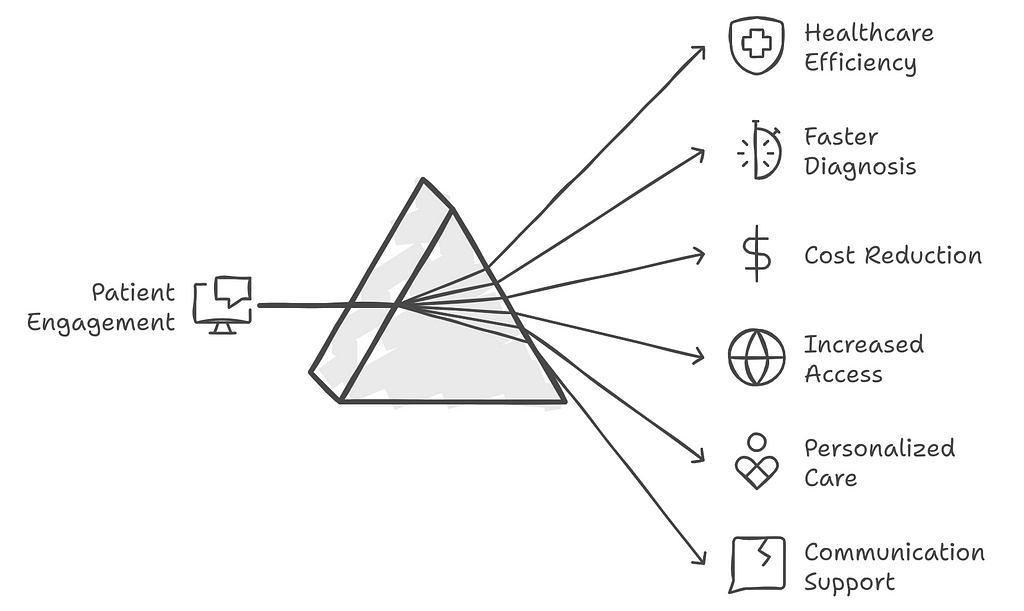
- Improved Patient Engagement: Conversational AI chatbots offer 24/7 availability, providing patients with instant access to information, guidance, and support. This constant engagement helps improve the overall patient experience, ensuring that people receive answers and advice when they need it most.
- Enhanced Efficiency for Healthcare Providers: By automating repetitive tasks such as scheduling, follow-up reminders, and answering common questions, Conversational AI reduces the workload of healthcare professionals. This allows doctors and nurses to focus on more critical tasks, increasing productivity and reducing burnout.
- Faster Diagnosis and Treatment: AI-driven chatbots can collect patient data such as symptoms, medical history, and lifestyle details, providing healthcare providers with essential information upfront. This accelerates the diagnosis process and ensures faster treatment, especially in urgent or critical cases.
- Cost Reduction: Automating administrative processes and patient inquiries with Conversational AI can significantly reduce operational costs for healthcare facilities. From handling billing inquiries to managing appointments, AI-driven solutions minimize the need for human intervention in routine processes, leading to cost savings.
- Increased Access to Healthcare: Conversational AI breaks down barriers to healthcare, providing accessible services to underserved or remote populations. Patients who lack access to nearby healthcare facilities can use AI-powered chatbots to seek medical advice, monitor health conditions, and schedule virtual consultations.
- Personalized Care and Proactive Health Monitoring: AI tools can offer personalized health advice based on patient data, such as medical history, symptoms, and lifestyle choices. In addition, AI-driven platforms can proactively monitor patient health through wearables, alerting them or their doctors when medical attention is needed.
- Language and Communication Support: Conversational AI tools equipped with language translation capabilities enable healthcare providers to communicate effectively with non-native speakers. This ensures that language barriers don’t compromise the quality of care, making healthcare services more inclusive and accessible.
- Better Mental Health Support: Conversational AI platforms are being increasingly used to provide mental health support, offering guidance and therapeutic suggestions for individuals dealing with stress, anxiety, or depression. These AI-driven tools can offer non-judgmental spaces for patients to express their feelings and get recommendations for professional help if necessary.
By integrating Conversational AI into healthcare systems, providers can improve patient outcomes, optimize workflows, and create a more efficient, patient-centered healthcare experience.
Conversational AI in Medical Research and Data AnalyticsConversational AI is poised to revolutionize medical research and data analytics, enabling researchers and healthcare professionals to harness vast amounts of data efficiently and effectively. Here are some key applications and benefits of Conversational AI in this domain:
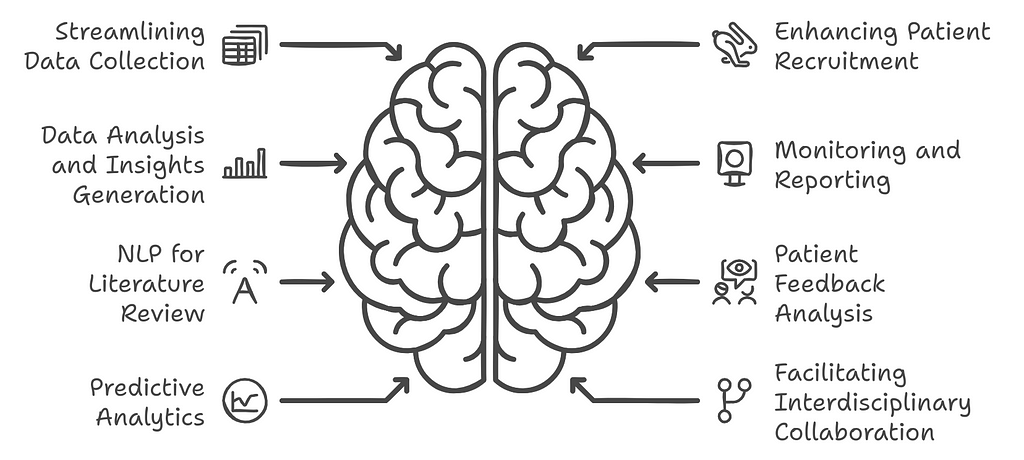 1. Streamlining Data Collection
1. Streamlining Data Collection- Description: Conversational AI can automate the process of collecting data from participants in clinical trials or research studies. By using chatbots or voice assistants, researchers can gather information through interactive conversations, surveys, or questionnaires.
- Impact: This approach increases participant engagement, improves data accuracy, and reduces the time required for data collection, leading to faster study outcomes.
- Description: AI-driven chatbots can assist in identifying and recruiting suitable participants for clinical trials by pre-screening potential candidates based on eligibility criteria. They can engage with patients through messaging platforms or websites to assess their interest and qualifications.
- Impact: This speeds up the recruitment process, ensuring that trials can commence more quickly and potentially reducing overall research timelines.
- Description: Conversational AI can facilitate data analysis by querying large datasets in natural language. Researchers can interact with data using simple conversational queries, allowing them to gain insights without needing advanced data analytics skills.
- Impact: This democratizes data access, enabling more researchers to explore complex datasets and derive valuable insights, ultimately accelerating the pace of discovery.
- Description: Conversational AI can automate the reporting process for ongoing studies by providing real-time updates on participant responses, data collection progress, and study metrics. Researchers can query the system to receive summaries and detailed reports.
- Impact: This enhances transparency and allows researchers to make informed decisions quickly, improving the overall management of research projects.
- Description: Conversational AI tools equipped with NLP capabilities can assist researchers in conducting literature reviews by summarizing vast amounts of published research, identifying key trends, and extracting relevant information.
- Impact: This reduces the time researchers spend on manual literature reviews, allowing them to focus on designing and executing their studies.
- Description: Conversational AI can gather feedback from patients regarding their experiences during clinical trials or after treatments. Analyzing this data helps researchers understand patient perspectives and improve study protocols or treatment methods.
- Impact: This leads to more patient-centered research, enhancing the relevance and effectiveness of clinical trials.
- Description: By analyzing historical data and integrating real-time inputs, Conversational AI can help researchers identify trends and make predictions regarding disease outbreaks, treatment efficacy, or patient responses to therapies.
- Impact: This can enhance decision-making processes in clinical settings and inform public health initiatives, ultimately leading to improved patient outcomes.
- Description: Conversational AI can serve as a collaborative tool for researchers across different disciplines by enabling seamless communication and knowledge sharing. Researchers can discuss findings, share insights, and ask questions using natural language interfaces.
- Impact: This fosters collaboration, leading to more innovative solutions and a holistic understanding of complex medical issues.
- Description: Conversational AI can assist researchers in ensuring compliance with regulatory requirements by providing real-time guidance on documentation, reporting, and ethical considerations. This includes managing informed consent processes through conversational interfaces.
- Impact: This reduces the risk of compliance violations, streamlining the regulatory process and enhancing the integrity of research efforts.
- Description: Conversational AI can serve as a training tool for researchers and healthcare professionals, offering interactive educational resources, quizzes, and assessments. This can help in skill development related to research methodologies and data analytics.
- Impact: Improved training will enhance the research community’s capability, leading to better quality studies and more informed research practices.
Conversational AI is set to transform medical research and data analytics by streamlining processes, enhancing collaboration, and enabling more efficient data utilization. As AI technologies continue to advance, their integration into research methodologies will accelerate innovation and improve healthcare outcomes.
Considerations for Building a Conversational AI Strategy for Healthcare OrganizationsDeveloping an effective Conversational AI strategy in healthcare requires careful planning and consideration of various factors to ensure that the implementation aligns with organizational goals and delivers value to patients and providers. Here are key considerations for healthcare organizations:
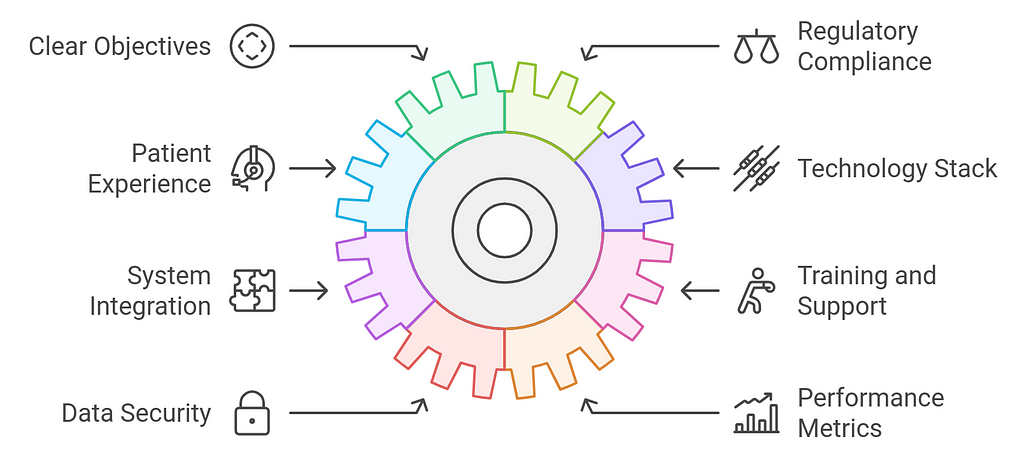 1. Define Clear Objectives
1. Define Clear Objectives- Description: Start by identifying the primary goals of implementing Conversational AI. Whether it’s improving patient engagement, streamlining administrative processes, or enhancing clinical outcomes, having clear objectives will guide the strategy.
- Action: Collaborate with stakeholders across departments to understand their needs and expectations.
- Description: Ensure that the Conversational AI solution complies with healthcare regulations such as HIPAA in the U.S. or GDPR in Europe, which govern the handling of sensitive patient data.
- Action: Work with legal and compliance teams to establish data privacy and security protocols throughout the implementation process.
- Description: Prioritize the user experience when designing conversational interfaces. The AI should be intuitive, user-friendly, and capable of understanding natural language to engage patients effectively.
- Action: Conduct user testing and gather feedback to refine the AI’s conversational abilities, ensuring it meets patient needs.
- Description: Choose the appropriate technology stack, including natural language processing (NLP) capabilities, machine learning frameworks, and integration options with existing healthcare systems (EHRs, CRMs).
- Action: Evaluate various vendors and technologies to determine which best aligns with the organization’s needs and budget.
- Description: Ensure seamless integration of Conversational AI with existing healthcare systems, such as electronic health records (EHRs), scheduling systems, and patient management platforms.
- Action: Work closely with IT departments to facilitate integration and ensure that data flows smoothly between systems.
- Description: Create a comprehensive training program for staff to ensure they understand how to interact with the Conversational AI and leverage its capabilities effectively.
- Action: Provide ongoing support and resources to staff, encouraging feedback to continuously improve the system.
- Description: Prioritize data security and privacy throughout the development and implementation of the Conversational AI solution.
- Action: Use encryption, secure access controls, and regular audits to protect sensitive patient information from breaches.
- Description: Define key performance indicators (KPIs) to measure the success of the Conversational AI implementation. Metrics may include patient satisfaction, engagement rates, and operational efficiency improvements.
- Action: Continuously monitor performance and adjust strategies based on data-driven insights.
- Description: Conversational AI technology is constantly evolving. Establish a plan for ongoing evaluation and improvement to keep pace with advancements and changing patient needs.
- Action: Regularly review user feedback, performance metrics, and technological updates to refine the AI system and enhance its capabilities.
- Description: Involve patients and other stakeholders in the planning and development process. Their insights can help shape a more effective Conversational AI strategy.
- Action: Conduct focus groups or surveys to gather input from patients, caregivers, and healthcare providers on desired features and functionalities.
- Description: Consider the ethical implications of using Conversational AI in healthcare, including issues related to bias, transparency, and accountability.
- Action: Develop ethical guidelines to ensure that the AI operates fairly and does not inadvertently reinforce biases present in the data.
Building a Conversational AI strategy for healthcare organizations involves careful planning and collaboration across various departments. By focusing on patient experience, regulatory compliance, and continuous improvement, organizations can leverage Conversational AI to enhance healthcare delivery, improve patient engagement, and drive operational efficiencies.
Key Use Cases and Applications of Conversational AI in HealthcareBy 2025, Conversational AI will be deeply integrated into healthcare systems, driving innovation across various applications. Here are some of the most impactful use cases expected:
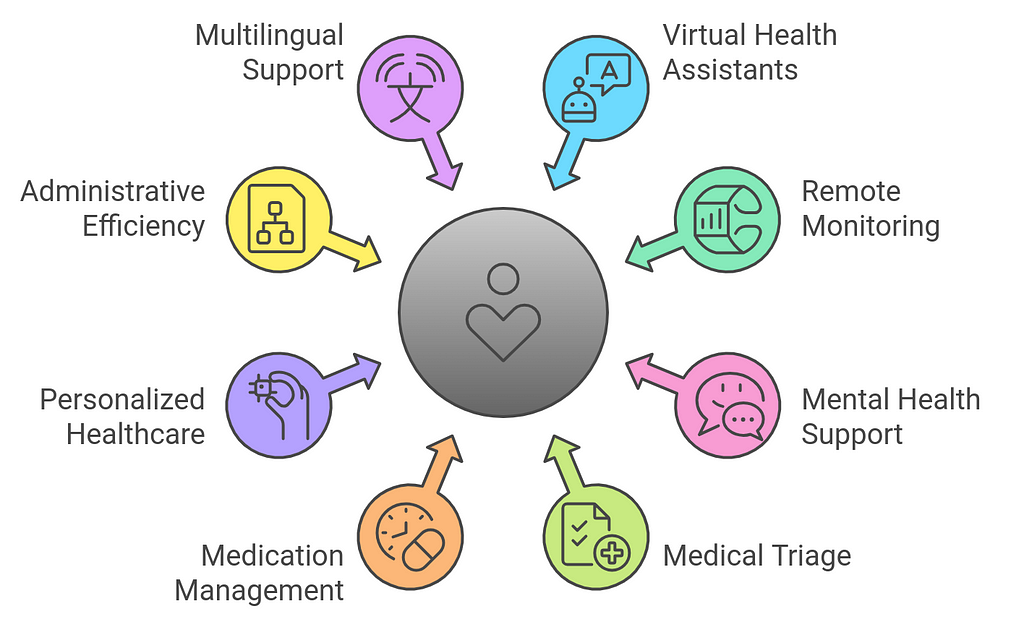 1. AI-Powered Virtual Health Assistants
1. AI-Powered Virtual Health Assistants- Description: Virtual health assistants will handle a wide range of tasks, from triaging symptoms and scheduling appointments to answering patient questions. These AI-driven tools will support both patients and healthcare providers, offering real-time information and personalized advice.
- Impact: By reducing the workload of administrative staff and providing patients with constant access to information, these assistants will improve operational efficiency and patient satisfaction.
- Description: Conversational AI systems will monitor patients remotely through wearable devices and sensors, collecting data on vital signs, activity levels, and sleep patterns. AI chatbots will communicate with patients, offering real-time feedback and suggesting when to seek medical attention.
- Impact: This will enhance chronic disease management, improve care for elderly or disabled patients, and reduce the need for in-person visits.
- Description: AI chatbots designed specifically for mental health will offer emotional support, helping individuals manage conditions like depression, anxiety, and stress. These AI systems will be able to detect emotional cues in conversations and provide personalized coping strategies, mindfulness exercises, and even crisis intervention.
- Impact: By offering immediate, round-the-clock mental health assistance, these AI tools will expand access to mental healthcare, especially for underserved populations.
- Description: Conversational AI will gather detailed symptom data, medical history, and other relevant health information from patients before they see a healthcare provider. The AI can suggest probable conditions and prioritize patients based on severity.
- Impact: This will reduce patient waiting times, improve diagnostic accuracy, and allow doctors to focus on more critical cases by automating initial evaluations.
- Description: Conversational AI systems will remind patients to take their medications, alert them to potential drug interactions, and monitor adherence to prescribed treatments. These systems will be capable of answering medication-related questions and adjusting reminders based on patient behavior.
- Impact: This will enhance medication compliance, reduce readmission rates, and improve overall treatment outcomes, particularly for patients managing chronic illnesses.
- Description: AI systems will analyze patient data to offer personalized treatment plans for chronic conditions such as diabetes, hypertension, and asthma. Conversational AI can track symptoms, adjust treatment recommendations, and provide feedback based on real-time data from wearable devices.
- Impact: Patients will benefit from continuous, personalized care that adapts to their condition, improving long-term outcomes and quality of life.
- Description: Conversational AI will streamline administrative processes, such as billing, claims processing, and appointment scheduling. It will handle insurance inquiries, patient data management, and post-visit follow-ups, reducing the administrative burden on healthcare workers.
- Impact: Hospitals and clinics will see increased efficiency, reduced errors, and cost savings, allowing them to reallocate resources to patient care.
- Description: Conversational AI with natural language processing (NLP) capabilities will enable real-time communication between patients and providers who speak different languages. These systems will translate medical advice, allowing non-native speakers to receive accurate healthcare guidance.
- Impact: This will break down language barriers and improve access to care for diverse populations, particularly in multilingual regions.
- Description: Conversational AI will assist in physical therapy, rehabilitation exercises, and post-surgery care by offering step-by-step guidance and tracking patient progress. AI systems will provide personalized exercise routines and give real-time feedback on performance.
- Impact: Patients will receive consistent support throughout their recovery, improving adherence to rehabilitation programs and reducing the need for in-person therapy sessions.
- Description: Conversational AI will play a key role in educating patients about their conditions, treatment options, and preventive measures. AI chatbots will provide tailored information based on patient profiles and preferences, helping individuals make informed decisions about their healthcare.
- Impact: By empowering patients with knowledge, Conversational AI will promote self-care, reduce hospital readmissions, and improve overall health literacy.
By 2025, Conversational AI will play a central role in transforming healthcare, enabling more efficient, accessible, and personalized care. From virtual assistants to real-time monitoring and multilingual support, AI-driven solutions will enhance both patient experiences and healthcare outcomes, marking a significant shift toward digital health transformation.
Data Privacy and Ethical ConsiderationsData privacy and ethical considerations are critical in the implementation of Conversational AI in healthcare. With the increasing reliance on AI-driven systems, safeguarding sensitive patient information becomes paramount. These systems often handle vast amounts of personal data, including medical histories, treatment plans, and personal identifiers, making them targets for data breaches and misuse. Healthcare providers must ensure compliance with regulations such as HIPAA and GDPR, which dictate stringent standards for data protection and patient consent.
Additionally, ethical concerns arise around transparency, accountability, and bias in AI algorithms. It’s essential to develop AI systems that are fair, unbiased, and equitable to prevent discrimination in healthcare access and treatment outcomes. Engaging patients in conversations about how their data will be used and ensuring robust security measures are in place can help build trust. As Conversational AI continues to evolve, addressing these privacy and ethical issues will be crucial for its responsible and effective integration into healthcare.
Challenges Facing Conversational AI in HealthcareConversational AI in healthcare faces several challenges that can hinder its effectiveness and adoption. One major issue is the complexity of medical language and terminology, which can lead to misunderstandings between AI systems and users. Ensuring that these technologies can accurately interpret and respond to diverse medical queries requires ongoing advancements in natural language processing. Additionally, data privacy and security concerns are significant, as AI systems often handle sensitive patient information. Maintaining compliance with regulations like HIPAA is crucial, yet can be challenging.
Another challenge is the integration of Conversational AI with existing healthcare systems, which can be fragmented and vary widely between providers. This can create interoperability issues and complicate data sharing. Furthermore, addressing biases in AI algorithms is vital to ensure equitable healthcare access for all patients. Finally, there is the need for continuous user education and training to facilitate trust and adoption among both healthcare professionals and patients. Overcoming these challenges will be essential for realizing the full potential of Conversational AI in healthcare.
The Future of Conversational AI in HealthcareThe future of Conversational AI in healthcare looks promising, with technological advancements poised to significantly enhance patient care, streamline operations, and improve overall health outcomes. Here are some key trends and predictions for the evolution of Conversational AI in this critical sector:
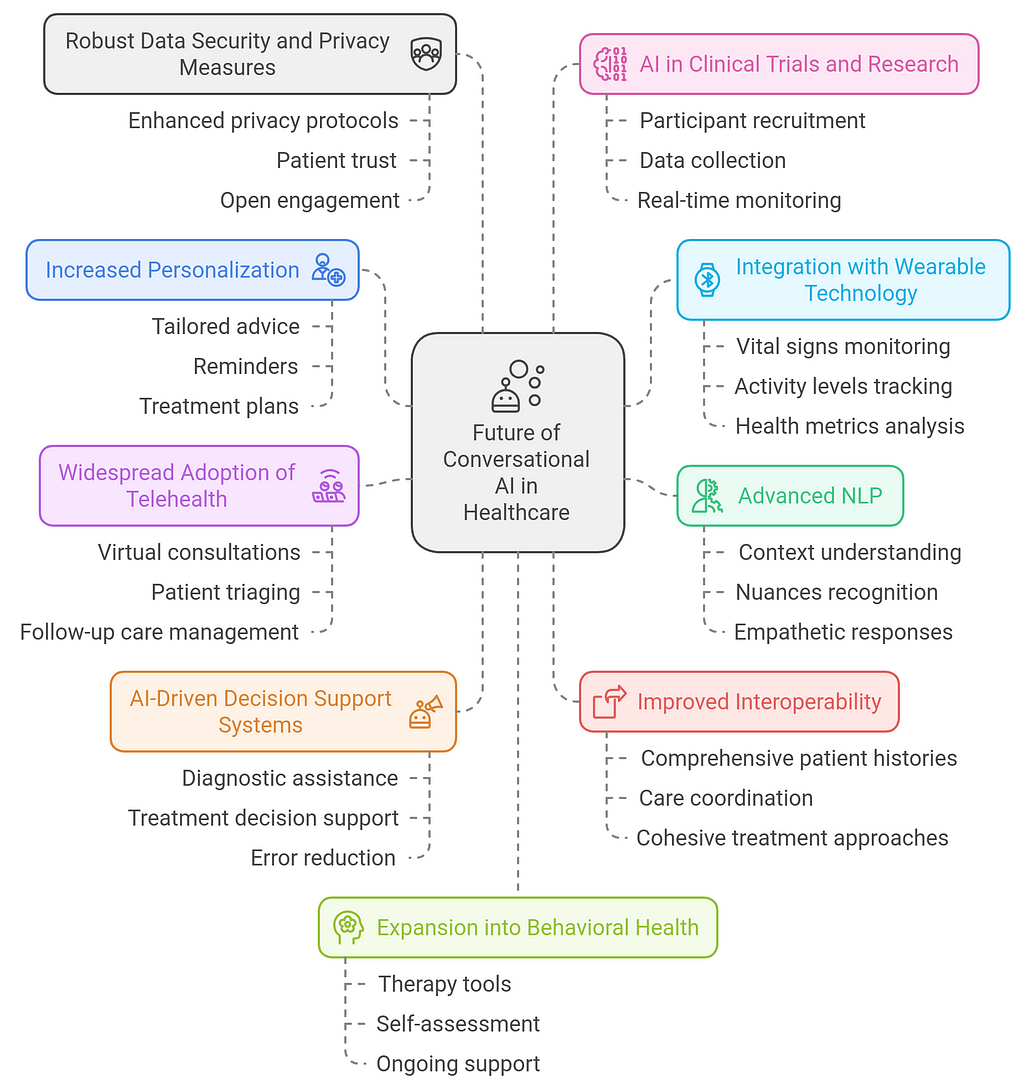 1. Increased Personalization
1. Increased Personalization- Description: As AI algorithms become more sophisticated, Conversational AI will offer increasingly personalized interactions based on individual patient data, preferences, and medical histories.
- Future Impact: Patients will receive tailored advice, reminders, and treatment plans, leading to improved engagement and adherence to care protocols.
- Description: Conversational AI will seamlessly integrate with wearable health devices that monitor vital signs, activity levels, and other health metrics.
- Future Impact: This integration will allow for real-time communication between patients and AI systems, providing instant feedback and recommendations based on health data, thereby facilitating proactive healthcare management.
- Description: Ongoing improvements in NLP will enable Conversational AI to better understand context, nuances, and emotions in patient interactions.
- Future Impact: This will lead to more natural and meaningful conversations, enhancing patient satisfaction and allowing AI systems to provide empathetic responses, especially in mental health support.
- Description: As telehealth becomes more mainstream, Conversational AI will play a crucial role in facilitating virtual consultations, triaging patients, and managing follow-up care.
- Future Impact: This will increase access to healthcare services, particularly for rural or underserved populations, and improve continuity of care.
- Description: Conversational AI will evolve into decision support tools for healthcare providers, offering insights based on large datasets and previous case studies.
- Future Impact: By assisting clinicians with diagnostic and treatment decisions, AI will enhance the quality of care and reduce the likelihood of errors, ultimately leading to better patient outcomes.
- Description: Future developments will focus on creating interoperable systems that allow Conversational AI to access and share data across various healthcare platforms and EHR systems.
- Future Impact: This will facilitate comprehensive patient histories and streamline care coordination among different providers, leading to more cohesive treatment approaches.
- Description: As Conversational AI systems handle sensitive health information, there will be an increased focus on developing robust security measures to protect patient data.
- Future Impact: Enhanced privacy protocols will build trust among patients, encouraging them to engage more openly with AI systems and share vital health information.
- Description: Conversational AI will become integral in clinical trials by assisting with participant recruitment, data collection, and real-time monitoring.
- Future Impact: This will lead to faster, more efficient research processes, enabling the development of new treatments and therapies at an accelerated pace.
- Description: Conversational AI will increasingly support mental health initiatives by providing tools for therapy, self-assessment, and ongoing support.
- Future Impact: This will help reduce stigma around mental health issues and make psychological support more accessible to a broader audience.
- Description: Conversational AI systems will continuously learn from interactions, adapting to evolving patient needs and preferences.
- Future Impact: This will lead to more effective communication strategies and improved patient engagement, ensuring that care is not only reactive but also proactive.
The future of Conversational AI in healthcare is bright, with the potential to transform patient experiences, enhance clinical practices, and drive innovative research initiatives. As technology evolves, so will the capabilities of Conversational AI, making healthcare more personalized, accessible, and efficient than ever before.
ConclusionIn conclusion, Conversational AI is poised to become a transformative force in healthcare by 2025, offering solutions that enhance patient engagement, streamline administrative workflows, and support clinical decision-making. The integration of AI-powered chatbots and virtual assistants is already making healthcare more accessible and efficient, and this trend will only grow in the coming years. As the technology evolves, its potential to analyze vast amounts of patient data, offer personalized care, and assist healthcare professionals in real-time will lead to improved outcomes and a more patient-centered approach to care.
However, with these advancements come challenges, including data privacy concerns, the need for regulatory frameworks, and the importance of ensuring AI-driven systems are inclusive and equitable. Despite these hurdles, the future of Conversational AI in healthcare looks promising, with its capacity to bridge gaps in care, reduce operational costs, and deliver better, faster, and more personalized services. As healthcare continues to embrace AI, its impact will be profound, reshaping the way care is delivered worldwide.
Conversational AI in Healthcare: A Complete Guide For 2025 was originally published in Coinmonks on Medium, where people are continuing the conversation by highlighting and responding to this story.
